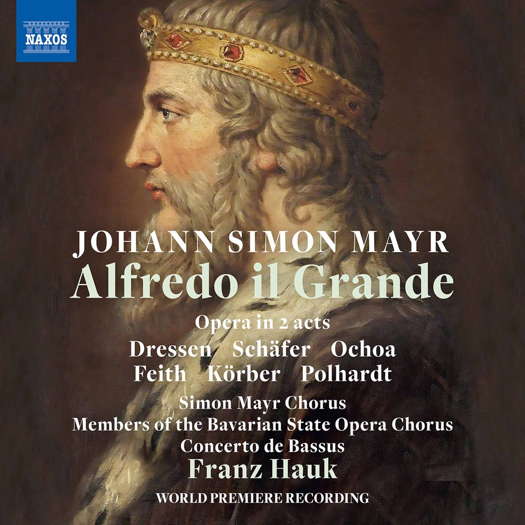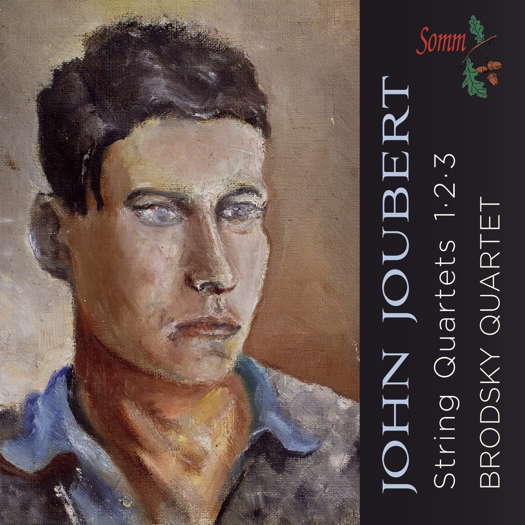 SPONSORED: An Outstanding Evening - Bill Newman listens to American pianist Rorianne Schrade.
SPONSORED: An Outstanding Evening - Bill Newman listens to American pianist Rorianne Schrade.
All sponsored features >>

Beautiful and Well-crafted
GERALD FENECH listens to Johann Simon Mayr's opera 'Alfredo il Grande'
'This is a gem of a premiere recording that should enhance Mayr's reputation as a truly fine opera composer which he richly deserves.'
Johann Simon Mayr was born on 4 June 1763 in the Bavarian town of Mendorf, the son of a schoolteacher, and showed some early promise as a musician. As he grew up he continued to show great musical versatility, but his real musical training only began in earnest in 1787, when a patron took him to Italy. From 1789 he studied with Carlo Lenzi, maestro di cappella of the Bergamo Basilica of Santa Maria Maggiore. Through the generosity of another patron he was able to further his studies in Venice with Bertoni.
At first Mayr concentrated his efforts on writing oratorios, but in 1794 his opera Saffo was staged in Venice, and this was the turning point in his career as an operatic composer. Other stage-works followed for Venice, then La Scala, Milan and other Italian theatres, with a large number of performances abroad. In 1802 he followed Lenzi as 'maestra di cappella' of the Santa Maria Maggiore Basilica in Bergamo, establishing a free music school three years later. Mayr held these positions until his death in 1845. As a teacher he won the respect of his pupil Gaetano Donizetti, who was later to become one of the pillars of Italian bel canto. Indeed, Donizetti later spoke very highly of his teacher and admitted he owed much of his success to Mayr's influence. He did much to promote the knowledge of the Viennese classical composers Haydn, Mozart and Beethoven in Italy. His own style reflects something of this, but essentially in an Italian context. He was, as expected, an immensely prolific composer and, by the time of his demise on 2 December 1845, Mayr had amassed some seventy operas and six hundred sacred works, and, if it were not for his blindness in the last years of his life, his catalogue would have been much more profuse. Another famous Italian composer who was inspired by Mayr's musical acumen was none other than Gioacchino Rossini.
This lavishly presented Naxos set focuses on one of the composer's last operas, Alfredo il Grande. In the ninth century, medieval England experienced a period of political consolidation and cultural revival under Alfred the Great. When Danish Vikings attacked England in around 866, and a series of battlefield successes in the following years threatened the Anglo-Saxons with conquest, Alfred managed to inflict a crushing defeat on the Danes at Edington in 878 and to defend his Wessex territory against renewed attack. This turn of events led him to being acknowledged as a successful general and feudal overlord, and he was ultimately declared overall ruler, thus paving the way for the unification of all regions in England. Alfred brought great cultural and social changes, and quite soon after his death in 899, he was being venerated as a saint, although he was never officially canonised.
All this and other historical events of the time exerted a strong influence on Mayr, especially during his final, more or less, proto-Romantic period. Shortly before he stopped writing operas around 1820, Mayr engaged one of his pupils, Bartolomeo Merelli (1794-1879), later to become the famous La Scala impresario, to adapt an old libretto by Gaetano Rossi and base it on the exploits of Alfred. Merelli picked out an important episode from the 878 battles against the Danes, when Alfred had narrowly missed being taken prisoner before finally managing to turn the war in his favour from his base in the Somerset marshes. Merelli adapted this legendary incident, in which the hero, having been abandoned by his vassals, travels incognito as a bard-cum-harpist (called Elfrido), attacks his enemies and rescues his beloved Alsvita. He thus made the piece more operatic while retaining Rossi's characterisation and sequence of events.
Listen — Mayr: Sinfonia (Alfredo il Grande)
(8.660483-84 CD1 track 1, 0:00-1:00) ℗ 2022 Naxos Rights (Europe) Ltd :
The story is as follows: Act I opens with Gutrumo the Danish leader besieging the castle where Alfred has taken refuge but has now fled. Alsvita, the castellan's daughter, who loves Elfrido (Alfred in disguise), prepares to go on a hunting spree. Meanwhile Elfrido returns to the castle in search of his beloved. At not finding her he collapses with emotion and longing, but is found by his warriors who rejoice that he is still alive. Just then Alsvita appears, running away from a group of Danish warriors. Elfrido and his men duly save the girl. Reunited, the two lovers sing an impassioned love duet. Alinda, Alsvita's confidante, now enters the scene to report the Danish attack. Gutrumo enters the hall as victor, but asks for peace in return for Alsvita's hand. Appalled, she refuses. The next instance finds Elfrido entering the fray with drawn sword and challenging Gutrumo. It is too late, as the castle is already surrounded.
Listen — Mayr: Finale (Alfredo il Grande Act I)
(8.660483-84 CD1 track 15, 0:00-0:58) ℗ 2022 Naxos Rights (Europe) Ltd :
Act II commences with Gutrumo's capture of the castle by force. Elfrido's latest escape induces Gutrumo to threaten to murder Eterberto, Alsvita's father and the castellan. She tries desperately to prevent this barbarity as she wrestles feverishly with her emotions. The wedding day of Gutrumo and Alsvita has arrived. During the ceremony, Amundo, Gutrumo's general, brings the news of Elfrido's death. Alsvita immediately faints. Elfrido, disguised as a Scottish bard, enters, singing with a harp on his own fate. Gutrumo gets suspicious and orders an end to everything. Meanwhile, Elfrido remains secretly behind with Alsvita to tell her that rescue is near. They confess their love for each other in a passionate duet. Gutrumo, furious, chains Elfrido, who is carried off by the soldiers. Gutrumo threatens to execute Elfrido in an attempt to make Alsvita decide. Suddenly, there is a change in the situation. Supporters of Elfrido disguised as shepherds force their way into the camp and free their leader as fighting ensues on the streets after Alsvita is taken captive. Elfrido and Etelberto eventually rescue her. Elfrido tells the girl that King Alfred offers her his hand and his throne. Alfred ascends the throne and, after five years of war, England is now free again. Alsvita finally discovers that the man she loves is indeed King Alfred. Gutrumo is pardoned and the opera ends with everyone's rejoicing as peace returns again.
Listen — Mayr: Finale (Alfredo il Grande Act II)
(8.660483-84 CD2 track 17, 0:00-0:56) ℗ 2022 Naxos Rights (Europe) Ltd :
This is not much of a plot for today's tastes, but one must bear in mind that in Mayr's time these colpi di scena filled stories were considered ideal for operatic purposes. Alfredo il Grande was premiered on 26 December 1819 at the Teatro della Società, Bergamo, and the reaction of both critics and audience was highly positive. Act II in particular came in for lavish praise. Unfortunately, this work, and almost all of Mayr's seventy operas, have disappeared from the repertoire. We have to thank Opera Rara, and Franz Hauk and Naxos in particular, for resurrecting a healthy number of stage-works by this composer, whose music is as beautiful and well-crafted as that of any other opera composer of his day. Indeed, I find some of Mayr's late operatic language much more telling than early Rossini and Donizetti.
Alfredo il Grande is a superb piece of entertainment, and with its grandiose choruses and sensuous melodies this opera was conceived on a monumental scale. Imaginative, exciting, dramatic and, above all, abundantly tuneful, it made a substantial contribution to the development of the melodramma romantico, and exerted a strong influence on the next generation of bel canto composers. Franz Hauk, the world's leading expert and exponent of Mayr's music, is an indefatigable advocate and tireless restorer of this composer's works, and up to now he has already twenty-five Naxos recordings to his credit. Alfredo il Grande adds yet another significant world premiere to the Mayr catalogue, and this performance is nothing short of electrifying. Indeed, Hauk draws some absolutely glorious singing from the soloists, bringing out all the dramatic flair of the characters with flawless conviction, and his period band Concerto de Bassus responds enthusiastically with style and precision. Choruses, sung by the Simon Mayr Chorus and members of the Bavarian State Opera Chorus, are despatched with the sweep and fervour that the story demands.
Listen — Mayr: Finale (Alfredo il Grande Act II)
(8.660483-84 CD2 track 17, 6:55-7:47) ℗ 2022 Naxos Rights (Europe) Ltd :
This is a gem of a premiere recording that should enhance Mayr's reputation as a truly fine opera composer which he richly deserves.
Copyright © 18 September 2022
Gerald Fenech,
Gzira, Malta

CD INFORMATION - JOHANN SIMON MAYR: ALFREDO IL GRANDE



